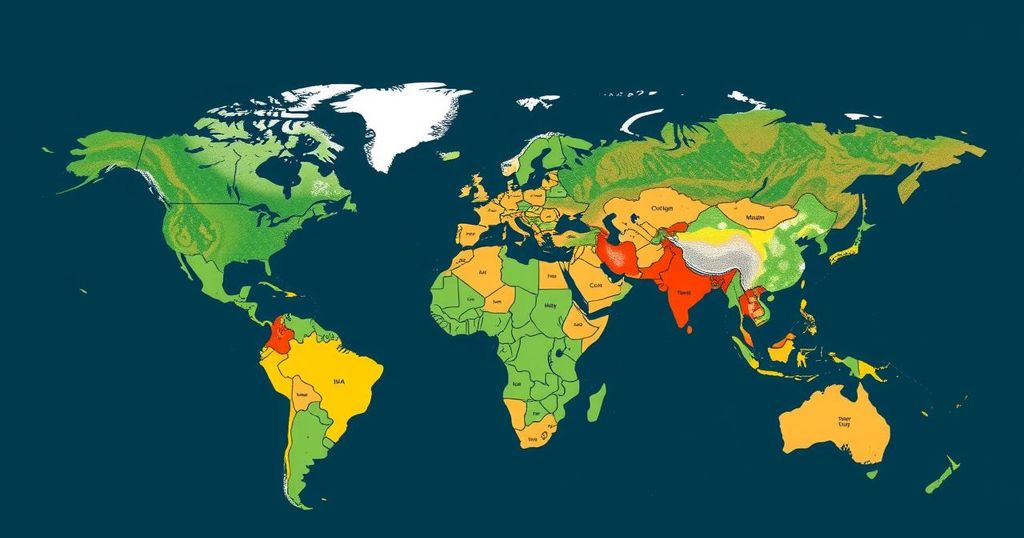Wealthier Countries Begin Paying Poorer Nations for Climate Change Damages
Wealthier nations have begun providing financial compensation for climate change damages to poorer countries, exemplified by Christopher Bingala, who received $750 after Cyclone Freddy devastated Malawi. This compensation is part of a broader $720 million fund initiated by developed countries to assist in climate-related recovery, though experts suggest this is insufficient given the increasing severity of climate disasters. Negotiations at the COP29 summit aim to define financial responsibilities towards developing nations more clearly, addressing ongoing needs amid escalating climate risks.
The devastating impact of Cyclone Freddy in Malawi has drawn attention to a new funding mechanism called “loss and damage” compensation aimed at helping poorer nations navigate the consequences of climate change. In 2023, Christopher Bingala faced the destruction of his home and livelihood as the cyclone struck, yet he received approximately $750, enabling him to rebuild. This funding is part of a broader initiative initiated last year, wherein wealthier countries pledged around $720 million to assist lower-income nations grappling with climate-induced disasters. However, experts caution that this amount is insufficient given the escalating intensity of extreme weather events.
As countries convene at the COP29 climate summit in Baku, Azerbaijan, discussions center on determining the financial responsibilities owed to developing nations as part of a larger climate finance package. Philip Davis, Prime Minister of the Commonwealth of the Bahamas, expressed hope for accountability from industrialized nations whose emissions significantly drive climate change.
The chaos unleashed by Cyclone Freddy displaced an estimated 650,000 individuals in Malawi alone. Having lost access to food and stability, Bingala and his family were compelled to rely on temporary housing. The timely cash payment from Scotland allowed them to relocate and reconstruct their daily lives under more favorable conditions.
Scotland’s pioneering initiative represents the first dedicated funding channel for loss and damage, administered by GiveDirectly, a nonprofit that aids individuals without restrictions. Similar payments have reached approximately 2,700 families in Malawi, providing essential resources for rebuilding and recovery. Experts emphasize that low-income households in these regions often have scant protections against calamities, underscoring the need for a broader, systemic approach to climate financing.
The demand for loss and damage funding is projected to rise dramatically as climate disasters proliferate. Recognizing the financial burden on nations like the Bahamas, Prime Minister Davis noted that his country’s national debt has escalated due to the impact of climate-related crises. Although initial pledges have been made, many parties contend that the proposed funds should extend beyond disaster recovery to also include proactive initiatives that safeguard vulnerable populations against future threats.
The urgency for an effective loss and damage funding mechanism is increasingly apparent, with estimates suggesting that annual costs could reach $250 billion by 2030. Davis warned that if proactive measures are not taken, wealthier nations would ultimately experience the repercussions of inaction as climate change continues to displace and endanger populations globally.
In light of the persistent and severe impacts of climate change, particularly on low-income countries, a significant international dialogue has emerged around the issue of climate finance and specifically, loss and damage compensation. This initiative aims to address the inequities faced by nations that contribute minimally to global greenhouse gas emissions yet suffer the greatest consequences of environmental disasters. The establishment of a dedicated fund for loss and damage emerged from negotiations held at previous climate summits, culminating in commitments from wealthier nations to provide financial resources for recovery and adaptation in developing countries.
The establishment of a loss and damage compensation fund represents a vital step towards addressing the disproportionate impact of climate change on low-income nations. While initial financial commitments have been made, substantially more resources and a broader framework are required to tackle the accelerating crises arising from climate-related disasters. Both humanitarian and environmental considerations call for a collaborative and proactive approach to climate finance, ensuring that vulnerable communities receive timely and adequate support.
Original Source: www.waer.org




Post Comment